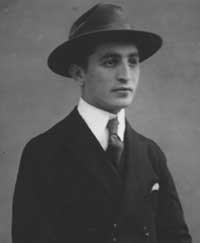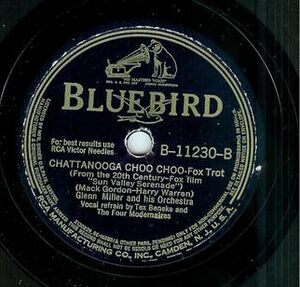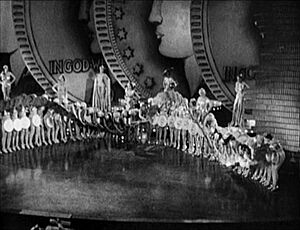Harry Warren facts for kids
Quick facts for kids
Harry Warren
|
|
|---|---|

Warren promoting songs
on Tin Pan Alley, 1920 |
|
| Background information | |
| Birth name | Salvatore Antonio Guaragna |
| Born | December 24, 1893 New York City, U.S. |
| Died | September 22, 1981 (aged 87) Los Angeles, California, U.S. |
| Genres | Popular music |
| Occupation(s) | Composer |
| Instruments | Piano |
Harry Warren (born Salvatore Antonio Guaragna; December 24, 1893 – September 22, 1981) was a very important American composer. He was one of the first major American songwriters to create music mainly for movies. He was nominated for the Academy Award for Best Original Song eleven times. He won three Oscars for his songs: "Lullaby of Broadway", "You'll Never Know", and "On the Atchison, Topeka and the Santa Fe".
Warren wrote the music for the first huge movie musical, 42nd Street. He worked closely with the famous choreographer Busby Berkeley on many musical films. Over his long career, which lasted six decades, Harry Warren wrote more than 800 songs. Some of his other well-known hits include "I Only Have Eyes for You", "You Must Have Been a Beautiful Baby", "Jeepers Creepers", "The Gold Diggers' Song (We're in the Money)", "That's Amore", "There Will Never Be Another You", "The More I See You", "At Last", and "Chattanooga Choo Choo". "Chattanooga Choo Choo" was even the first song in history to become a gold record! Warren was one of America's most active film composers, and his songs have been featured in over 300 movies.
Contents
Biography: The Life of Harry Warren
Growing Up: Harry Warren's Early Life
Harry Warren was born Salvatore Antonio Guaragna on December 24, 1893, in Brooklyn, New York. He was one of eleven children born to Italian immigrants, Antonio and Rachel De Luca Guaragna. His father was a bootmaker. When Harry was a child, his father changed the family name to Warren.
Even though his family couldn't afford music lessons, Harry loved music from a young age. He taught himself to play his father's accordion. He also sang in the church choir and learned to play the drums. By age 14, he was playing drums professionally. At 16, he left high school to play with his godfather's band in a traveling carnival.
Soon, he taught himself to play the piano. By 1915, he was working at Vitagraph Motion Picture Studios. There, he did many different jobs, like setting up props and playing mood music on the piano for actors. He even acted in small parts and became an assistant director. He also played piano in cafés and silent movie theaters. In 1918, he joined the U.S. Navy, where he started writing songs.
A Career in Music: Harry Warren's Songwriting Journey
Harry Warren wrote over 800 songs between 1918 and 1981, and more than 500 of them were published. Most of his songs were written for 56 feature films. His music eventually appeared in over 300 movies. His songs were also used in 112 Looney Tunes and Merrie Melodies cartoons from Warner Bros..
Forty-two of his songs made it onto the top ten list of the radio show "Your Hit Parade", which showed how popular a song was. Twenty-one of these songs reached number 1 on the show! His song "You'll Never Know" appeared 24 times on the list. "I Only Have Eyes for You" is listed as one of the 25 most-performed songs of the 20th Century by ASCAP (American Society of Composers, Authors, and Publishers). Warren was also a director for ASCAP from 1929 to 1932.
Warren worked with many talented lyricists (people who write song words) to create his most famous songs. These included Al Dubin, Billy Rose, Mack Gordon, Leo Robin, Ira Gershwin, and Johnny Mercer.
The First Gold Record: "Chattanooga Choo Choo"
In 1942, the song "Chattanooga Choo-Choo", written by Gordon and Warren, became the first gold record in history. The Glenn Miller Orchestra performed it. It was the number 1 song for nine weeks on the Billboard pop singles chart in 1941–1942, selling 1.2 million copies!
Some of his other huge hits included "There Will Never Be Another You", "I Only Have Eyes for You", "Forty-Second Street", "The Gold Diggers' Song (We're in the Money)", "Lullaby of Broadway", "Serenade In Blue", "At Last", "Jeepers Creepers", "You're Getting to Be a Habit with Me", "That's Amore", and "Young and Healthy".
Early Successes and Film Work
Warren's first hit song was "Rose of the Rio Grande" in 1922, with words by Edgar Leslie. He wrote many hit songs in the 1920s, like "I Love My Baby (My Baby Loves Me)" (1925) and "Nagasaki" (1928). In 1930, he wrote music for the song "Cheerful Little Earful" for a Broadway show called Sweet and Low.
He started working for Warner Brothers in 1932. There, he teamed up with Al Dubin to write the music for the first big movie musical, 42nd Street. He stayed at Warner Brothers for six years, writing music for 32 more musicals.
Later, he worked for 20th Century Fox starting in 1940, writing with Mack Gordon. In 1944, he moved to MGM, where he wrote for musical films like The Harvey Girls and The Barkleys of Broadway. Many of these movies starred the famous dancer Fred Astaire. In the early 1950s, he worked for Paramount. He wrote for movies like Just for You (starring Bing Crosby) and The Caddy (starring Martin and Lewis), which included the hit song "That's Amore". He continued to write songs for several more Jerry Lewis comedies.
Warren is especially remembered for writing music for the films of Busby Berkeley. They worked together on 18 movies! Their fast-paced songs were as memorable as Berkeley's dance routines. They perfectly captured the fun and energy of the Jazz Age.
Oscar Wins and Nominations
Harry Warren won the Academy Award for Best Song three times. Each time, he worked with a different lyricist:
- "Lullaby of Broadway" with Al Dubin in 1935.
- "You'll Never Know" with Mack Gordon in 1943.
- "On the Atchison, Topeka and the Santa Fe" with Johnny Mercer in 1946.
He was nominated for eleven Oscars in total.
Later Years and Legacy
In 1955, Warren wrote "The Legend of Wyatt Earp" for the ABC television series, The Life and Legend of Wyatt Earp. He also wrote the opening theme, "Hey, Marty", for the film Marty (1955), which won the Academy Award for Best Picture.
His last musical score specifically for Broadway was Shangri-La in 1956. He continued to write songs for movies throughout the 1960s and 1970s, but he didn't achieve the same level of fame he had earlier. His last movie score was for Manhattan Melody in 1980, but the film was never made.
In 1962, Warren composed a Mass (a type of religious music) with Latin words. It was performed ten years later but has not been recorded for sale. He also wrote almost three dozen short piano pieces called vignettes. Some of these were released on an album in 1975.
Personal Life and Passing
Harry Warren married Josephine Wensler in 1917. They had a son, Harry Jr. (who passed away in 1938), and a daughter, Joan (born in 1925). His wife, Josephine, passed away in 1993.
Harry Warren passed away on September 22, 1981, in Los Angeles. He is buried in the Westwood Village Memorial Park Cemetery in Los Angeles. His gravestone has the first few notes of his famous song "You'll Never Know" carved on it.
Harry Warren's Impact and Recognition
Many people in the music world recognized Harry Warren's talent. Even though he wrote so many famous songs, he wasn't always as well-known as some other composers. He was often called the "invisible man" because his name wasn't as famous as his songs.
In 1980, the 1933 film 42nd Street was turned into a Broadway musical. This musical won the Tony Award for Best Musical in 1981 and ran for a very long time. The show used many songs by Warren and Dubin from different movie musicals.
In 1982, a theater in Gravesend, Brooklyn, New York, was named the Harry Warren Theatre in his honor.
Famous Songs by Harry Warren
Here are some of the songs with music by Harry Warren:
Academy Award Winners and Nominees
- Winners
- "Lullaby of Broadway" (1935) with Al Dubin for Gold Diggers of 1935
- "You'll Never Know" (1943) with Mack Gordon for Hello, Frisco, Hello
- "On the Atchison, Topeka and the Santa Fe" (1945) with Johnny Mercer for The Harvey Girls
- Nominations
- "Remember Me?" (1937) with Al Dubin for Mr. Dodd Takes the Air
- "Jeepers Creepers" (1938) with Johnny Mercer for Going Places
- "Down Argentina Way" (1940) with Mack Gordon for Down Argentine Way
- "Chattanooga Choo Choo" (1941) with Mack Gordon for Sun Valley Serenade
- "I've Got a Gal in Kalamazoo" (1942) with Mack Gordon for Orchestra Wives
- "Zing a Little Zong" (1952) with Leo Robin for Just for You
- "That's Amore" (1953) with Jack Brooks for The Caddy
- "An Affair to Remember (Our Love Affair)" (1956) with Harold Adamson and Leo McCarey for An Affair to Remember
Songs That Reached Number 1
- "By the River Sainte Marie" (1931) with Edgar Leslie
- "Too Many Tears" (1932) with Al Dubin
- "I Found a Million Dollar Baby (in a Five and Ten Cent Store)" (1932) with Mort Dixon
- "You're Getting to Be a Habit With Me" (1933) with Al Dubin
- "Forty-Second Street" (1933) with Al Dubin
- "Shadow Waltz" (1933) with Al Dubin
- "(You May Not Be an Angel, But) I'll String Along With You" (1934) with Al Dubin
- "Lullaby of Broadway" (1935) with Al Dubin
- "She's a Latin from Manhattan" (1935) with Al Dubin
- "I'll Sing You a Thousand Love Songs" (1936) with Al Dubin
- "September in the Rain" (1937) with Al Dubin
- "With Plenty of Money and You" (1937) with Al Dubin
- "Remember Me?" (1937) with Al Dubin
- "Jeepers Creepers" (1938) with Johnny Mercer
- "You Must Have Been a Beautiful Baby" (1938) with Johnny Mercer
- "Chattanooga Choo Choo" (1941) with Mack Gordon
- "My Heart Tells Me (Should I Believe My Heart?)" (1943) with Mack Gordon
- "I Had the Craziest Dream" (1943) with Mack Gordon
- "You'll Never Know" (1943) with Mack Gordon
- "The More I See You" (1945) with Mack Gordon
- "On the Atchison, Topeka and the Santa Fe" (1945) with Johnny Mercer
Other Popular Songs from Films
- "You're Getting to Be a Habit with Me" (1932) with Al Dubin for 42nd Street
- "Forty-Second Street" (1933) with Al Dubin for 42nd Street
- "Shuffle Off to Buffalo" (1933) with Al Dubin for 42nd Street
- "The Boulevard of Broken Dreams" (1933) with Al Dubin for Moulin Rouge
- "Keep Young and Beautiful" (1933) with Al Dubin for Roman Scandals
- "Pettin' in the Park" (1933) with Al Dubin for Gold Diggers of 1933
- "We're in the Money" (1933) with Al Dubin for Gold Diggers of 1933
- "I Only Have Eyes for You" (1934) with Al Dubin for Dames
- "I'll String Along with You" (1934) with Al Dubin for Twenty Million Sweethearts
- "About a Quarter to Nine" (1935) with Al Dubin for "Go into Your Dance"
- "Lullaby of Broadway" (1935) with Al Dubin for Gold Diggers of 1935
- "September in the Rain" (1935) with Al Dubin for Stars Over Broadway
- "You Must Have Been a Beautiful Baby" (1938) with Johnny Mercer for Hard to Get
- "Chica Chica Boom Chic" (1941) with Mack Gordon for That Night in Rio
- "I, Yi, Yi, Yi, Yi (I Like You Very Much)" (1941) with Mack Gordon for That Night in Rio
- "Chattanooga Choo Choo" (1941) with Mack Gordon for Sun Valley Serenade
- "I Know Why (And So Do You)" (1941) with Mack Gordon for Sun Valley Serenade
- "It Happened in Sun Valley" (1941) with Mack Gordon for Sun Valley Serenade
- "At Last" (1941) with Mack Gordon for Sun Valley Serenade
- "I Had the Craziest Dream" (1942) with Mack Gordon for Springtime in the Rockies
- "Serenade In Blue" (1942) with Mack Gordon for Orchestra Wives
- "There Will Never Be Another You" (1942) with Mack Gordon for Iceland
- "You'll Never Know" (1943) with Mack Gordon for Hello, Frisco, Hello
- "On the Atchison, Topeka and the Santa Fe" (1945) with Johnny Mercer for The Harvey Girls
- "The More I See You" (1945) with Mack Gordon for Diamond Horseshoe
- "This Heart of Mine" (1946) with Arthur Freed for Ziegfeld Follies
- "Cryin' For the Carolines" (1930) with Sam Lewis and Joe Young for Spring Is Here
- "Have A Little Faith In Me" (1930) with Sam Lewis and Joe Young for Spring Is Here
- "(The Same Thing Happens with) The Birds and the Bees" (1956) Mack David for The Birds and the Bees
Other Popular Songs
- "Cheerful Little Earful" (1930) with Ira Gershwin and Billy Rose for Sweet & Low
- "Nagasaki" (1928) with Mort Dixon
 | Precious Adams |
 | Lauren Anderson |
 | Janet Collins |



